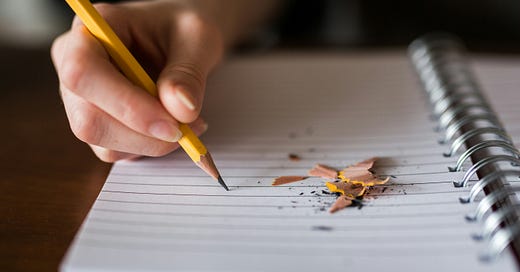Manifesto
I want to write poems that write me back— wild streams of words to sweep me from my careful path. I want to write poems that break me like a line, shape me to the softness of assonance and rhyme. I want to write poems that root like an oak— sow acorn sounds in crumbling ground, let them grow and grow grow. I want to write poems that are needle and thread— that stab me to stitch me into the world and out of my head. I want to write poems that pulse like a heart— poems that beat and poems that spark, a red rush of words to wherever you are.
Photo by Thought Catalog on Unsplash
The Prompt
I recently finished reading
’s debut poetry collection, “Instructions for Traveling West.” It’s raw and gritty and gorgeous. I turned the pages like I was reading a novel, albeit with a considerable amount of gasping over the beauty of this or that line. Somewhere—now I can’t remember where—I read that Joy said her hope for the book was that it would light a tiny blue flame in the heart of each reader. This got me thinking about my own hopes for my poetry. What is it I’m trying to do here? And not just here on Substack, but also in the privacy of my own notebooks and Word docs and piles of random paper scraps?The above poem emerged from that question. And part of what I realized is that while yes, I do want to hone my skills as a poet and continue to learn and improve, and yes, I want to reach more readers and build meaningful connections with them, and yes, I want my words to move or help readers in some way . . . also, I really just want to let myself be changed by the process of writing, regardless of the outcome on the page. That, to me, is the magic of writing poetry—the way it writes me back. The way it reshapes my inner landscape, sharpens my senses, breaks my illusion of separation, softens me up, stitches me to the world. Sure, I’d love for my poetry to change the outer world for better. But mostly, I hope it will keep changing me—keep teaching me to show up to the world with more wisdom, more compassion, more curiosity and humor and play, more attunement to our interconnectedness.
Why do you write? What are your hopes and dreams for your poems or other literary offspring? What pulls you back to the page over and over again? How would you fill in the blank here: “All of this writing will be worth it if __________.”
If you’d like a prompt to play with it today, then I invite you to sit with those questions. Let your truest answers rise to the surface. There are no right-for-everyone or wrong-for-everyone answers here, dears. This is not a test of selflessness or detachment or nobility. If your first internal answer to that fill-in-the-blank above was “if I finally get published” or “if I write a best seller” or “if my arch enemy reads my words and turns green with envy,” then let that be your ink. Dip your pen in it. Press it to the page. See what happens.
Something brings you here to this gathering of writers (and lovely, supportive readers who are not yet writers). I’d love to learn what it is. I’ll be camping with my four boys (three human, one canine) for the next couple days, but I look forward to reading your poems and comments when I return!






All of this writing
will be worth it if........
It rotates the stock in my monkey-mind
enuf
to sneek a peek
at what lurks
underneath.
Many years ago, in Vermont in the early 1980's, I saw a book of poetry by Hayden Carruth with the title "If You Call this Cry and Song." Lisa's prompt and the memory of that line brought this poem today.
“If you call this cry a song…”
Parenthetical line from
the Song of Two crows.
Lyrical line that found me
So many years ago.
My writing since then
A desperate attempt
to write that
one line,
one phrase,
one poem
that cries,
that sings
that dances
off the page
into your heart
And you want to be
that writer, that poet
whose words live long after
earth has called you home.
If I call this cry a song
Will you hear
Its longing
or its love?